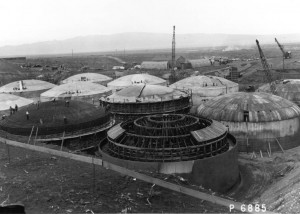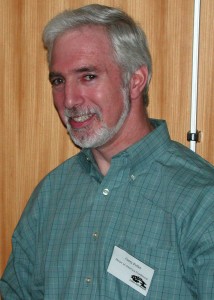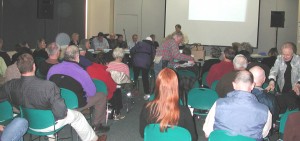On May 12, 2009, a public meeting and hearing was conducted by the Hanford Tri-Party Agencies to discuss a tentative agreement to modify cleanup action plans at the Hanford Nuclear Reservation. Tri-Party officials present included Matt McCormick, Dave Brockman, and Stacy Charboneau, U.S. Department of Energy; Ron Skinnarland, Washington State Department of Ecology; and Rod Lobos, US Environmental Protection Agency.
In January 2009, the Tri-Party agencies completed negotiations on cleanup projects at the Hanford site, including changes that would push cleanup deadlines out by several years. Officials were not going to hold public meetings to review proposed changes to the Tri-Party Agreement, but succumbed to public pressure from Gerry Pollet and Heart of America Northwest.
Mr. Pollett attended the meeting and voiced substantive opposition to proposed cleanup delays and relaxed cleanup standards.
Tri-Party officials seemed nervous and defensive, and crammed hours of presentation materials into mere minutes of fast-fired techno-babble. One overwhelmed attendee asked how citizens could even produce credible comments on proposed changes to cleanup plans when the public meeting was held only three days prior to the deadline for submission of comments.
Changes to the cleanup plan were precipitated by nearly $2 billion in additional funding secured by the American Recovery and Reinvestment Act, otherwise known as federal stimulus funds. The purpose of stimulus funds is to create jobs, and is designed to facilitate hiring as many people as quickly as possible without regard for cleanup priorities at the site. Members of the public, including RNA, spoke out against cleanup actions that will be delayed by several years without enforceable timelines because of the introduction of stimulus priorities into the cleanup work. Instead, public comments called for stimulus funds to enhance priority cleanup projects while maintaining established cleanup deadlines already in place.
Stimulus funds salvaged about 300 current jobs at Hanford, and will fund 800-1000 additional jobs, but these new jobs will be geared toward less complex, and lower priority cleanup actions. Stimulus funds are projected to provide jobs to decontaminate a plutonium finishing plant, to remediate burial ground trenches, to demolish facilities in the river corridor, to construct groundwater remedies in the River Corridor, and retrieve 10,800 drums of transuranic waste among other tasks.
Officials claim that the proposed changes to the Tri-Party Agreement enforce the public’s view that groundwater contamination is a priority in the revised cleanup schedule. However, Ms. Charboneau stated that stimulus funds will not be used to address one of the most serious problems at the site, the 149 single shell underground storage tanks that are leaking radioactive sludge into the groundwater and soils. Contaminated groundwater is now entering the Columbia River. An estimated 53 million gallons of sludge is uncontained at the reservation. The US Department of Energy only plans to remove radioactive sludge from a few leaking tanks per year, thus driving completion dates further out by several years. Ms. Charboneau explained the tank remediation program is slow due to the fact that there are inadequate facilities to process and contain the sludge for storage once it is removed from the leaking tanks. The vitrification facility that is being built to encase the radioactive sludge in glass for storage will not be ready until at least 2019. Ms. Charboneau also stated that the single shell tanks are structurally sound, meaning the concrete casings are not crumbling, but they are not leak proof.
RNA commented that the stimulus monies should be re-prioritized to address the lack of storage facilities for the sludge rather than pursuing other lower priority issues since the leaking tanks are one of the most pressing issues at the site. The source of groundwater contamination must be remediated before the threat to the Columbia River can be overcome. Instead, the Tri-Party Agreement proposes to install expensive upgrades and equipment to various buildings and laboratories that remain on site.
There are 180 square miles of contaminated groundwater at Hanford, and 80 square miles of the plume are contaminated with radioactive chromium and strontium. Mr. McCormick stated that it is not possible to restore chromium contaminated groundwater to clean drinking water standards.
Changes to the Tri-Party Agreement include leaving specific laboratory and treatment buildings in place for another 20 years, while allowing these buildings to be used by contractors. Meanwhile, sewage pipes that cannot be removed from beneath these buildings will still contain radioactive waste for the duration. The buildings, once slated for demolition, must now remain in place because there are insufficient funds to remove and then replace these facilities.
Buried drums of plutonium, another high risk problem, will continue to be removed and shipped offsite for processing to be transformed into “slab on grade” status for more stable storage.
Following public insistence, the Washington State Department of Ecology filed a lawsuit against the US Department of Energy due to missed deadlines surrounding the leaking storage tank problem. Within the past few weeks, the State of Oregon joined the State of Washington as a plaintiff in the case with the goal to enforce removal actions. Like the State of Washington, the State of Oregon is concerned that the revised Tri-Party Agreement erases or delays deadlines for project completion, pushing proposed completion dates past 2050. Many members of the public voiced opposition to these continued delays. RNA asked if the proposed changes to the Tri-Party Agreement included the withdrawal of Washington State’s lawsuit to enforce cleanup timelines, but Mr. Skinnarland explained the lawsuit was not impacted by the modified agreement and that the lawsuit would not be withdrawn.
Even though Washington State voters insisted that no more nuclear waste should be shipped to Hanford for storage until all of the current contamination is cleaned up, the US Department of Energy has been receiving nuclear waste shipments from the Puget Sound Naval Shipyard and Pearl Harbor in Hawaii. The Navy’s nuclear waste is comprised of nuclear reactor compartments from naval vessels.
Mr. McCormick announced the top contaminants of concern at the site:
Contaminants of concern in the Columbia River Corridor
- Chromium – Used to inhibit corrosion in reactor pipes, discharged to soil
- Strontium 90 – From within reactor, 30 year radioactive half-life
- Uranium – Radioactive half- life is tens of thousands of years
Contaminants of Concern in the Central Plateau Area
- Carbon Tetrachloride — solvent used to process plutonium
- Technetium — nuclear fission byproduct, radioactive half life is tens of thousands of years
- Uranium — Radioactive half life is tens of thousands of years
RNA’s Carol Panfilio offered this testimony and received applause from the audience:
“The hazardous waste that is “seeping”, (actually pouring) into the Columbia River from Hanford burial drums and tanks affects several hundred miles of farmland soils and the drinking water of many towns and cities in two states, as it flows into the Pacific Ocean. This must have immediate and ongoing action as our lives and livelihood depends on clean water and soil. There is clearly an epidemic of Thyroid and Breast Cancer in Washington and Oregon due to this contamination. These chemicals are even in the leaves of the trees along the Columbia in Vancouver. With approximately $2 Billion of stimulus package being appropriated to this cleanup project (which we the citizens have given), are not the citizens of this country the federal government? The funds must be utilized NOW with no further delays. Our health should never be negotiated to fit an administrative agenda.”













![Washington State Water Quality Assessment [303(d)] Washington State Department of Ecology](http://www.rosemerena.org/home/wp-content/uploads/2009/03/ecy_logo.gif)

